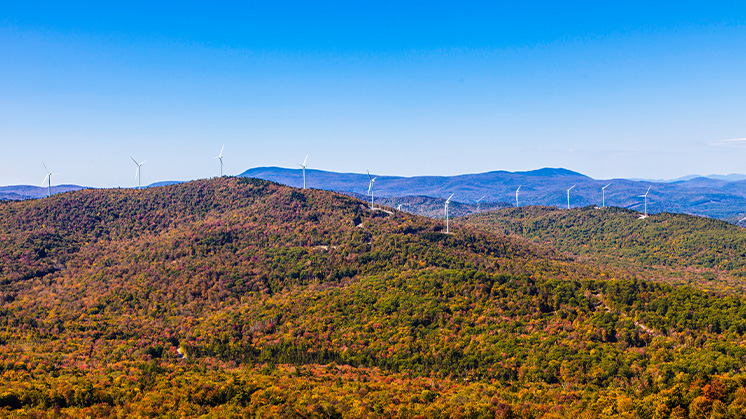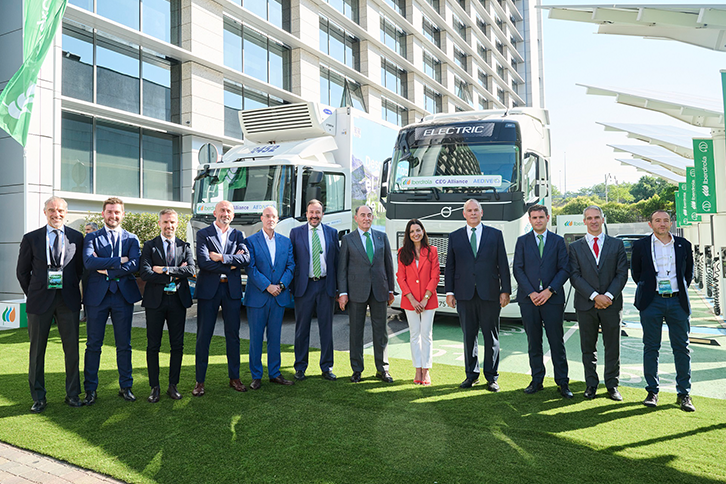Climate action
Iberdrola, global leader in climate action
Iberdrola Group is leading the way towards a decarbonised and resilient economy through a sustainable and efficient business model. The fight against climate change has been the main driver of our profitable growth strategy.

Committed to ambitious and urgent climate action
Iberdrola began the energy transition 20 years ago and has established itself as a global benchmark in climate action and clean energy.
Iberdrola’s Climate Action Plan, establishes the ambitious objectives of achieving carbon neutrality for scopes 1 and 2 by 2030 and net-zero emissions before 2040 for all scopes, including scope 3 (expressed in CO2eq).
Key elements of the Climate Action Plan
Objetives
- 2030
Neutrality in emissions for scopes 1 and 2
Direct emissions (generation and other) and indirect emissions fromelectricity T&D losses and own consumption
- <2040
Net-zero emissions for all scopes, including 3
Scopes 1, 2 and 3 (rest of indirect emissions that occur in sources that are not owned or controlled by the Company (e.g., gas sales, purchase of electricity for sale to the final customer, generation of electricity for third parties, suppliers)
Drivers
-
100 % Renewables
All energy 100% zero-emission
-
100% Intelligent networks
Networks more robust and 100% digitalised
-
Green procurement
100% green energy
Suppliers - Projects for joint reduction of emissions and use of "green" products
-
Green solutions for customers
Offer of green products and solutions (electrification, H2 green)
Alliances for green and decarbonized technologies
Values
-
Positive for society
Economy, industry and employment
Inclusive transition
Universal access to competitive energy
-
Positive for nature
Net positive impact on biodiversity in 2030
Circular Economy Model
Tools
-
Climate governance
-
Strategy and management of risks and opportunities
-
Technological and business innovation
-
Alliances and collaboration
-
Green finance

Iberdrola has approved near and long-termscience-based emissions reduction targets with the SBTi.
The SBTi has verified Iberdrola’s net-zero science-based target by 2039.
Iberdrola has approved science-based emission reduction targets in the short and long term with the Science Based Target (SBTi) initiative.
Climate action, a priority axis of our strategy
Iberdrola's By-Laws entrust its Board of Directors with responsibility for climate action. As such, the Group's highest management body is responsible for approving and updating a climate action plan that allows meeting the company's environmental objectives, as well as reporting annually on climate management.
In addition, the Climate Action Policy establishes the framework for Iberdrola's strategy and business model, aligned with the Paris Agreement and the 2030 Agenda. In it, Iberdrola continues to assume a leadership position (directly and by establishing alliances), promoting awareness (impacts, challenges, and benefits of achieving them), and contributing to a carbon neutral and sustainable future.
The Climate Action Policy includes among its priority lines of action the electrification of the economy. To achieve this, the Group will support regulatory initiatives to promote, for example, electric mobility and heat pumps, the "polluter pays" principle, the elimination of subsidies to high-emission technologies or sectors, the analysis of the risks arising from climate change and, in general, the development of a real and global energy transition.
The content of the Climate Action Policy, which has also been endorsed by shareholders at the General Meeting, is aligned with the recommendations of the TCFD (Task Force on Climate-related Financial Disclosure) External link, opens in new window., a benchmark platform on climate reporting, which sets out guidelines for integrating climate change into internal strategic planning and decision-making processes, as well as in the analysis, management and reporting of long-term risks.
External link, opens in new window., a benchmark platform on climate reporting, which sets out guidelines for integrating climate change into internal strategic planning and decision-making processes, as well as in the analysis, management and reporting of long-term risks.
We are moving towards net zero emissions
As a strategic pillar for its achievement, we are working according to the Group's investment plan, which is supported by innovation initiatives aimed at decarbonising the energy mix, increasing its resilience and consolidating the company's leadership in renewable energy, smart grids, efficient storage and clean technologies.

26.7
million tonnes of CO2 avoided in 2023 (1)

81 %
of the owned installed capacity is emission-free

71.7 %
of the owned installed capacity is from renewable energies

+ 5.4
billion euros invested in renewable energies in 2023

42,084
MW owned capacity in renewables

1,793
MW of offshore wind power in operation, key to the Group's growth

0
coal-fired power plants in the world after their closure

+ 13,400
billion euros of ESG financing in 2023
Data at the end of 2023.
(1) Information extracted from the "Statement of Non-Financial Information. Sustainability Report 2023".
Iberdrola is also committed to green and sustainable financing — it is the world's largest issuer of green bonds — and to innovation in clean energy. The company actively participates in climate summits and in various alliances that advocate ambitious and urgent climate action, with the next key meeting being COP29 in Bakú. It also works to raise public awareness of climate change and contributes to sustainable development. This work has been recognised by numerous international indices. Furthermore, in line with this commitment, we align ourselves with different initiatives such as World Energy Day.
Managing the risks and opportunities of climate change
Improving climate resilience involves assessing how climate change will create new risks or opportunities or alter existing ones. Building resilient systems involves, first and foremost, a technological transformation towards a decarbonised economy, thus avoiding worst-case scenarios and taking advantage of the opportunities offered by the energy transition. Thus, the Iberdrola Group's Climate Action Policy includes, among its priority lines of action, the analysis of the risks and opportunities arising from climate change in the field of energy transition, as well as physical risks, and the integration of climate science and adaptation and resilience criteria, to reduce or avoid the potential impacts of climate change on the activity. Iberdrola monitors and manages the impacts arising from climate change through an ongoing process of analysis based on climate science and its application in the Company's normal procedures, with a focus on planning, implementation, control, and ongoing improvement. From this analysis, we conclude that, although there are risks, in general terms Iberdrola's business model could be classified as resilient to climate change. For more information on our management of risks and opportunities, see the Statement of Non-Financial Information 2021.
Main climate risks
Climate change brings with it various risks, which to a large extent are not new risks for Iberdrola. These risks, which are included in the general risk control and management policy and are therefore monitored periodically, may be grouped into the following.
- TRANSITION risks, associated with all the risks that may appear in the progressive process of global decarbonisation , such as regulatory, market, technological, reputational, demand changes, demand variations, etc.
- PHYSICAL, arising from possible material impacts on the installations as a result of the effects of the future evolution of climatic variables , both chronic (increase in temperatures, rise in sea level, variation in rainfall patterns) and extreme (increase in frequency) and intensity of extreme weather events, such as heat waves, hurricanes, flooding, etc.
Other risks may arise from these risks, such as credit deterioration of counterparties, suppliers, banks, others, social phenomena, humanitarian crises, impacts on crops and fisheries, refugee crises, epidemics and increased competition for financial resources.












 Environmental footprint
Environmental footprint 




